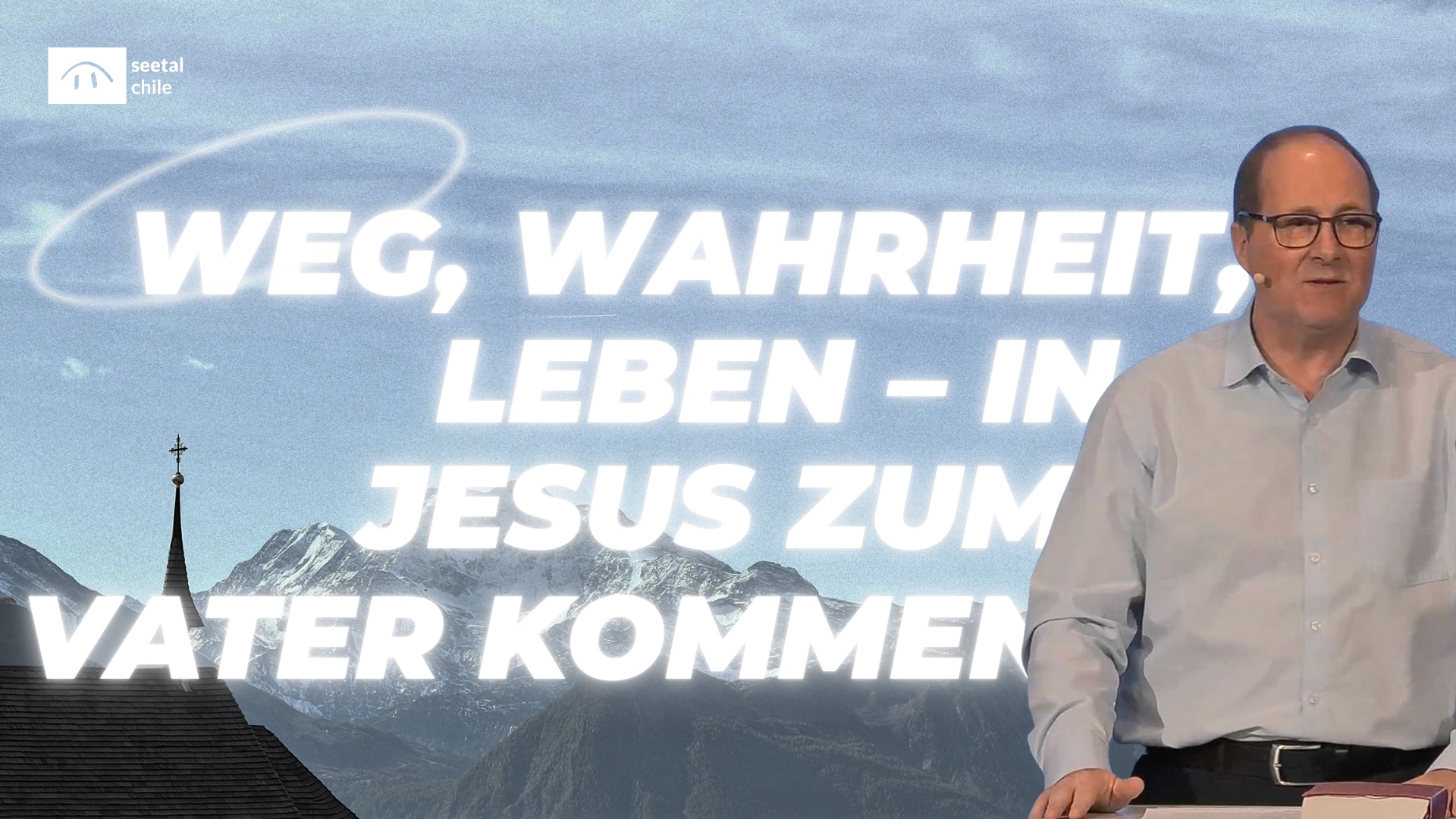Developing resilience
Series: Metamorphosis | Bible text: Matthew 7:13–14
The parable of the broad and narrow way has a formative and rather moralistic impact history. This was probably not Jesus» intention. In the context of the teaching on character and virtue in the Sermon on the Mount, He wants to tell us: Stop saying, «But that’s what gets me into trouble.» Be prepared to pay the price for living according to God’s standards. It is the condition for transformation towards Christlikeness.
As a child, I not only went to the Spitz schoolhouse during the week, but also to Sunday school. Sunday after Sunday, Mr Ruh, our Sunday school teacher, appeared. We children sat dutifully and disciplined at our places, sang «God is love» and were admonished to take the narrow path. A picture clearly showed us that the narrow way leads further and further away from the wide way. Jesus takes up this theme in the Sermon on the Mount: «Go through the narrow gate! For the wide gate and the broad way lead to destruction, and many are on that path. But the narrow gate and the narrow way lead to life, and only a few find this way» (Matthew 5:13–14 NGÜ). Obviously, this text has significance for virtue and character formation in life with Jesus. We are now tracing this meaning.
Wide or narrow path?
Around 1860, the Stuttgart merchant Charlotte Reihlen had a picture painted showing the two paths. In the following decades, this image made its way into many rooms and influenced generations of Christians. In the foreground of the picture is a wall with a wide-open gate on which a large Welcome! stands. It is the entrance to the wide path. Next to it stands a preacher in a suit. The narrow gateway to the narrow path is lined with Kingdom of God labelled.
The path to the kingdom of God is lined with a church, a Sunday school, a deaconess house and a charitable children’s home. It leads over narrow bridges, some scenes of threat are seen, which are mastered with trust in God. And a steep path leads up to a mountain top where the heavenly Jerusalem can be seen golden. On the horizon, stretched out far, the rainbow can be seen.
The other path, the one to Perdition, invites you right at the gate with a kind of hedge inn where wine is drunk. Then follow the inn to the sense of the worldwhich is holding a masked ball, followed by a casino, a debating club, a pawnshop. At one point there is once again a man who invites people to cross over onto the narrow path. The end of the path is a fiery inferno, a doomed city. Above the flames in the smoke one recognises circling black figures and a brightly shining scale as a sign of the Last Judgement.
A thoroughly moral picture that paints in problematic black and white. When I started working at Chrischona Seon 22 years ago, my office was in the Egliswil chapel. There was an elderly couple there who feared that I, as a young dynamic man, might be too worldly. That’s why they tacked the following Bible verse on the door: «Do not go under a foreign yoke with the unbelievers. For what has righteousness to do with lawlessness? What has light to do with darkness?» (2 Corinthians 6:14 LUT).
Anyone who drinks a beer in a beer garden, goes to the theatre or plays the lottery is not yet on the way to hell. Conversely, going to church or joining a deaconess» maternity home is not a free ticket to heaven. With two questions I try to make Jesus» two ways theology understandable.
Where is the narrow path?
Jesus did not geographically locate the two paths. Nowhere does it say that they run in opposite directions. If I illuminate this topic from the totality of the biblical statements, one would have to imagine the paths lying on top of each other, separating and then crossing again. Jesus needs the term «in the world, but not of the world»(John 17:14, 16). The narrow way runs in great measure in the midst of the broad way.
The religious imprint, as I described it at the beginning, has led to Christians forming their own milieu willy-nilly. Now and then, during certain political debates like Marriage for all or Abortion of children they appear like submarines, only to disappear again along the narrow path. They are perceived by the world as rather unworldly, know-it-all and self-righteous.
No, Jesus people belong in the world if they want to live out their destiny to be salt and light. Paul not only warned against «Pulling the same rope as the unbelievers», but gave the following useful tip: «Those who frequently come into contact with the affairs of this world should use them without becoming attached to them, for the world and all that belongs to it will pass away»(1 Corinthians 7:31 NLB). To use the things of the world without becoming attached to them. Enjoying the creation and creativity of people without becoming dependent on them.. We should give ourselves to the world without selling ourselves to it. How does that work?
How do you live on the narrow path?
Whenever our children went (or still go) to places where we did not have a good idea, we did not pray: «Oh Daddy, don’t let them go to the World Sense!», but: «Oh Daddy, let them be aware of their identity in you!» When a person is aware of his identity in Jesus, he remains free and does not sell himself to the world. This week Pray21 took place. At one station we were promised our identity in Jesus Christ through many objects: Beloved Child and Heir of God, Salt and Light, Letter of Christ, God’s Work, Made New, Members of His Body, etc.
I let this work on me and felt that this gives a strong foundation in my life. Being aware of one’s identity saves us from being taken in by the world. C.S. Lewis: «Precisely because we love something else more than this world, we love this world more than those who know nothing else.«Being on the narrow path means having something in life that is greater and more valuable than what the world has to offer. When Jesus Christ is our first priority, everything else finds its proper place. «Stop loving this world and what it offers you! For he who loves the world shows that the love of the Father is not in him»(1 John 2:15 NLB). Receiving the love of the Father is the basic prerequisite for giving ourselves to the world in a healthy way. When a woman prostitutes herself, she sells herself. She gives her body and gets money for it. In contrast, we are supposed to give ourselves to the world. This means that we should not derive our identity or value from it.
Moreover, a stable identity in Christ means knowing where home is. «For this world is not our home; we await our future city only in heaven»(Hebrews 13:14 NLB). This knowledge gives us the necessary inner distance from worldly things and pleasures. C.S. Lewis: «Aim for the next world and you will get this world. But if you aim only at this world, you will get neither.«Jesus speaks of the broad way that leads to destruction – and he says this to people who follow him. Apparently, it is possible for people who are on the narrow way to change to the broad way and run into ruin. This is when they sell themselves to the world, and they take their identity from the world. A boy buys canary and puts it in the cage with a sparrow, hoping the sparrow would learn to sing. After three days he gave up in frustration. The sparrow did not sound like a canary – instead, the canary sounded exactly like a sparrow.
But what does this have to do with the doctrine of virtue and character that the Sermon on the Mount deals with? Jesus says: «But the narrow gate and the narrow (harassing) path lead to life, and only a few find this way»(Matthew 5:14 NGÜ). The word that describes the way as narrow, strait or oppressive is often used in the Bible in the context of the affliction that Jesus people experience in this world. «In the world you come into distress» says Jesus in John 16:33. People who dance to the music of God, or are practising it, often face headwinds in this world. During a birthday visit to a very experienced person, I heard the phrase several times that life with Jesus is a struggle. That is true! How hard I struggle, for example, to allow myself time in prayer. Resistance comes not only from the visible world and from people, but also from the invisible world.
The character of people who follow Jesus, that is, who have entered the Jesus School, therefore includes resilience in the face of confrontations and afflictions. Affliction is a sign of authenticity of faith. For this the Gospel also uses the formula «bear the cross». In the world but not of the world – that can create a lot of friction. In the Beatitudes Jesus says: «Happy are you when people insult and persecute you for my sake and wrongly accuse you of the worst things. Rejoice and be glad!»(Matthew 5:11f NGÜ). So in resistance we should not keep our heads down, hide away and adopt a victim attitude («It’s just bad…»), but rejoice. The Greek word means: to rejoice, to leap, to express one’s joy by leaping, exuberant gaiety and delight. Luther translated with «then bounces like the fatted calves». However, it is important to note: «If it is wrong.» Not when we race through life with Bible verses and life looks very different. If they are right, we must change our lives and not jump like fattened calves! Jesus» message behind the parable of the two ways is thus: Stop saying, «But that’s what gets me into trouble.» Be ready to pay the price for living according to God’s standards.
Jesus says of himself: «Yes, I am the gate. Whoever enters through me will be saved. Wherever he goes he will find green pastures»(John 10:9 NLB). Jesus himself is the narrow gate that leads to true life. To be on the narrow way means to be oriented towards Jesus in life. The entrance fee to this path was also paid by Jesus. «God has paid a high price for you, therefore do not become slaves of men»(1 Corinthians 7:23 NLB). God has bought us dearly through the death of Jesus Christ. Jesus was sold and gave himself to us so that we might give ourselves to the world and not sell ourselves, because we have already been bought by him and that as a gift.
Possible questions for the small groups
Read the Bible text: Matthew 7:13–14
- What inner images of the narrow and wide path accompany you?
- How do you experience living in the world but not of the world? Where do you come into contact with the affairs of this world?
- Why is our identity so important in this issue?
- To what extent do you find the journey of life with Jesus oppressive? What kind of resistance do you know? What could be the problem if there is no resistance?
- There are two quotes from C.S. Lewis in the text. Why do you (dis)agree with them?







